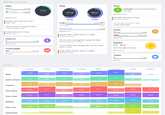Quantified Self
Part of a series on Physical Fitness. [View Related Entries]
[View Related Sub-entries]
This submission is currently being researched & evaluated!
You can help confirm this entry by contributing facts, media, and other evidence of notability and mutation.
Overview
Quantified Self, also known as personal informatics, bio-tracking, self-hacking, or auto-analytics, is a movement which incorporates technology and data-collection into daily life, including tracking things like exercise, sleep, calories, and heart rate in an effort to better quantify health and productivity. It is related to other self-tracking movements, including life-logging and sousveillance, but is more related to health and well-being.
History
The data-minded have always kept track of their personal metrics via personal charts and graphs; Buckminster Fuller was known to keep detailed accountings of his day-to-day activities.[2] The first wearable computers used in bio-analytic tracking were invented in the 1970s,[3] but the term "Quantified Self" was first proposed in 2007 by two contributing editors to Wired Magazine, Gary Wolf and Kevin Kelly, who started a company called Quantified Self to serve the growing community of bio-trackers with meetups, conferences, and other social tools to assist in comparisons.[4][5]
In a 2010 TED talk, Wolf explained that people had been using smartphones and the improvements in data processing to track every day things about their lives, including their diets and personal exercise regime. He wanted people to understand that this type of tracking could be used not only for external data collection, but also for self-knowledge.
Online Presence
Wolf and Kelly's company, Quantified Self, has been widely responsible for the popularity of the term. They maintain an official web site and a Twitter account, which has 13,500 followers as of August, 2015.[1][6] There is also a subreddit for people interested in Quantified Self-type tracking, which was created in 2011 and has over 2,000 readers as of August 2015.[7] There are 21 separate Usenet groups for different geographic sectors of the Quantified Self organization, and hundreds of separate meetups on Meetup for people interested in discussing the subculture.[8][9]
The Quantified Self movement has been widely reported on, as well, especially on blogs and in publications devoted to technology. The popular technology and lifestyle blog Lifehacker has hundreds of posts about Quantified Self-related items, including news on new styles of fitness tracking and devices.[10]
Members of the Quantified Self community use a variety of different apps and devices for their health tracking, including Fitbit, Apple Health, MyFitnessPal, Nomie, Google Fit, Exist, and Athos.




Notable Developments
Fitbit
Fitbit, also known as the Fitbit Tracker, is a type of wearable technology used to track fitness metrics like daily step counts, heart rate, and more. Because the devices include a social network as part of their operating system, their use has grown a subculture of self-quantification and personal metric tracking.
Fitbit was developed in 2007 in San Francisco, CA, by James Park and Eric Friedman. Their mission is “To empower and inspire you to live a healthier, more active life. We design products and experiences that fit seamlessly into your life so you can achieve your health and fitness goals, whatever they may be.”
Apple Healthkit and Researchkit
After the successes of Nike+ and the Fitbit, both of which are external devices that can interact with iPhones and iPods, Apple debuted the Apple HealthKit as a mandatory download with its 8th version of the Apple iOS. Working from the dominant idea that most iPhone users carry their phones with them at all times, HealthKit automatically tracked steps, stairs, and calories burned automatically, with the ability to enter more data through an app called Health. In addition, the framework included with HealthKit was easier for other apps to integrate, to take advantage of the software and hardware inside the iPhone to improve health-tracking. [11]
Another included framework, ResearchKit, allowed the data to be used by apps that would use it not for fitness but for instead for tracking health data for the control and research of illnesses like asthma, Parkinson's Disease, and diabetes.[12]
Search Interest
External References
[2] PS Mag – The Secret History of Life Hacking
[3] MIT Media Labs – Wearables Timeline
[4] Wikipedia – Quantified Self
[6] Twitter – Quantified Self
[7] Reddit – /r/quantifiedself
[8] Google Groups – Quantified Self
[9] Meetup – Quantified Self
[10] Lifehacker – Quantified Self Posts
[11] Apple Health – What's New: Health












Top Comments
Genry
Aug 17, 2015 at 06:28PM EDT
PatrickBateman96
Aug 17, 2015 at 09:54PM EDT